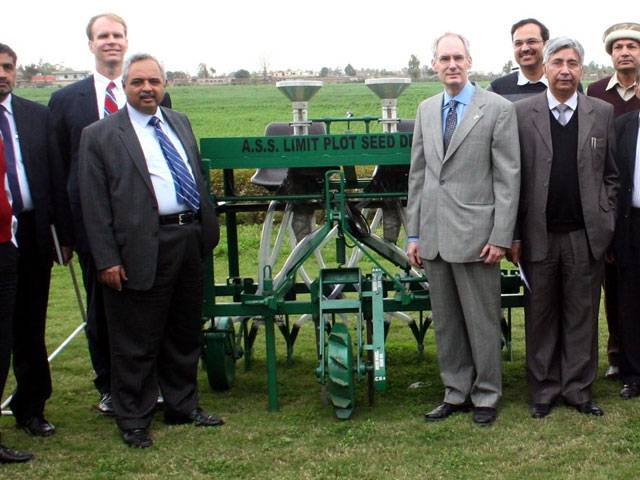ISLAMABAD - The United States Department of Agriculture (USDA) on Monday transferred latest wheat sowing technology to Pakistan with an aim to enhance healthy wheat production in the country.
The USDA, under US-Pakistan Wheat Productivity Enhancement Project (WPEP), handed over wheat sowing planters to various research institutions and universities that would replace the traditional hand-sowing crop systems and antiquated machinery, currently utilized in Pakistan. The planters would initially be utilized on pilot projects in these institutions and would be replicated to transfer the technology to farmers to enhance their crop productivity.
The wheat planters were handed over to these institutions at a ceremony at National Agricultural Research Center (NARC) which was jointly organized by the USDA, International Center for Maize and Wheat Improvement (CIMMYT), Pakistan Agricultural Research Council (PARC), and several Pakistani agriculture institutions and universities.
The USDA-sponsored WPEP has imported research-grade wheat planters for provincial and university partners to increase Pakistan’s wheat productivity.
Speaking on the handing-over ceremony, Secretary Ministry of National Food Security and Research (MNFS&R), Seerat Asghar said although population of the country was growing fast, we have been successful in catering to increasing food needs due to research conducted in the agriculture field.
He said that the wheat sowing technology should have been transferred three decades ago, however remarked that it was never too late, adding that the planters would particularly help small farmers to enhance their crop productivity. He said that the planters would be handed over to the local manufacturers to replicate the technology to ensure that farmers take benefit of this technology.
On the occasion, Chairman PARC, Dr Iftikhar Ahmad said that the WPEP project achieved the goal of increased productivity by introducing disease- resistant wheat varieties, building research capacity, improving disease surveillance systems, developing seed distribution systems, and modernizing national crop development programs through upgrading infrastructure and equipment.
USDA Agriculture Counselor in Pakistan, Clay Hamilton said that the transfer of planters to Pakistan was a symbol of long collaboration between Pakistan and US.
He stressed the need for enhancing links between researchers and farmers to achiever better results in agriculture production.
Director General NARC, Dr M Azeem Khan also spoke on the occasion and termed the inclusion of planters in Pakistan’s agriculture sector as a landmark development that would help produce better results of research in enhancing crop production.
Tuesday, May 21, 2024
US transfers wheat sowing technology to Pakistan

Caption: US transfers wheat sowing technology to Pakistan
Funeral for President Raisi, FM Hossein today
1:15 AM | May 21, 2024
Every institution should work within constitutional limits: Tarar
9:54 PM | May 20, 2024
Govt tables defamation bill in Punjab Assembly amid strong opposition protest
9:52 PM | May 20, 2024
ATC dismisses Parvez Elahi's bail petition in Jinnah House attack case
9:36 PM | May 20, 2024
PTI founder Imran Khan, others acquitted in Azadi March vandalism case
9:35 PM | May 20, 2024
Safety Ensured
May 20, 2024
Seizing Solar Power
May 20, 2024
Following Elders
May 20, 2024
NEPRA’s Neglect
May 19, 2024
Colonial Grip
May 19, 2024
Contumacious Political Cult
May 20, 2024
Balochistan: A Tourism Hub
May 20, 2024
Energy Taxes: A Heavy Burden
May 20, 2024
Unsung Heroes of Society
May 19, 2024
Water Shortage in Our Area
May 19, 2024
ePaper - Nawaiwaqt
Advertisement
Nawaiwaqt Group | Copyright © 2024





